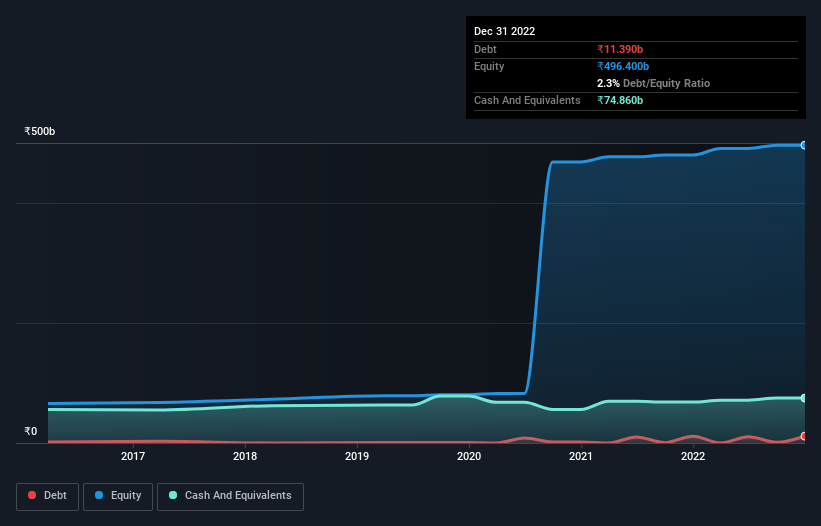- India
- /
- Personal Products
- /
- NSEI:HINDUNILVR
These 4 Measures Indicate That Hindustan Unilever (NSE:HINDUNILVR) Is Using Debt Reasonably Well

Some say volatility, rather than debt, is the best way to think about risk as an investor, but Warren Buffett famously said that 'Volatility is far from synonymous with risk.' When we think about how risky a company is, we always like to look at its use of debt, since debt overload can lead to ruin. We can see that Hindustan Unilever Limited (NSE:HINDUNILVR) does use debt in its business. But is this debt a concern to shareholders?
Why Does Debt Bring Risk?
Debt and other liabilities become risky for a business when it cannot easily fulfill those obligations, either with free cash flow or by raising capital at an attractive price. Ultimately, if the company can't fulfill its legal obligations to repay debt, shareholders could walk away with nothing. However, a more frequent (but still costly) occurrence is where a company must issue shares at bargain-basement prices, permanently diluting shareholders, just to shore up its balance sheet. Of course, plenty of companies use debt to fund growth, without any negative consequences. The first step when considering a company's debt levels is to consider its cash and debt together.
See our latest analysis for Hindustan Unilever
How Much Debt Does Hindustan Unilever Carry?
As you can see below, Hindustan Unilever had ₹11.4b of debt, at September 2022, which is about the same as the year before. You can click the chart for greater detail. However, it does have ₹74.9b in cash offsetting this, leading to net cash of ₹63.5b.

How Healthy Is Hindustan Unilever's Balance Sheet?
The latest balance sheet data shows that Hindustan Unilever had liabilities of ₹124.3b due within a year, and liabilities of ₹98.7b falling due after that. Offsetting this, it had ₹74.9b in cash and ₹26.6b in receivables that were due within 12 months. So its liabilities outweigh the sum of its cash and (near-term) receivables by ₹121.5b.
Of course, Hindustan Unilever has a titanic market capitalization of ₹5.91t, so these liabilities are probably manageable. Having said that, it's clear that we should continue to monitor its balance sheet, lest it change for the worse. Despite its noteworthy liabilities, Hindustan Unilever boasts net cash, so it's fair to say it does not have a heavy debt load!
And we also note warmly that Hindustan Unilever grew its EBIT by 11% last year, making its debt load easier to handle. When analysing debt levels, the balance sheet is the obvious place to start. But ultimately the future profitability of the business will decide if Hindustan Unilever can strengthen its balance sheet over time. So if you want to see what the professionals think, you might find this free report on analyst profit forecasts to be interesting.
Finally, a company can only pay off debt with cold hard cash, not accounting profits. Hindustan Unilever may have net cash on the balance sheet, but it is still interesting to look at how well the business converts its earnings before interest and tax (EBIT) to free cash flow, because that will influence both its need for, and its capacity to manage debt. Over the most recent three years, Hindustan Unilever recorded free cash flow worth 61% of its EBIT, which is around normal, given free cash flow excludes interest and tax. This cold hard cash means it can reduce its debt when it wants to.
Summing Up
We could understand if investors are concerned about Hindustan Unilever's liabilities, but we can be reassured by the fact it has has net cash of ₹63.5b. So is Hindustan Unilever's debt a risk? It doesn't seem so to us. There's no doubt that we learn most about debt from the balance sheet. However, not all investment risk resides within the balance sheet - far from it. For example, we've discovered 2 warning signs for Hindustan Unilever that you should be aware of before investing here.
If you're interested in investing in businesses that can grow profits without the burden of debt, then check out this free list of growing businesses that have net cash on the balance sheet.
If you're looking to trade Hindustan Unilever, open an account with the lowest-cost platform trusted by professionals, Interactive Brokers.
With clients in over 200 countries and territories, and access to 160 markets, IBKR lets you trade stocks, options, futures, forex, bonds and funds from a single integrated account.
Enjoy no hidden fees, no account minimums, and FX conversion rates as low as 0.03%, far better than what most brokers offer.
Sponsored ContentValuation is complex, but we're here to simplify it.
Discover if Hindustan Unilever might be undervalued or overvalued with our detailed analysis, featuring fair value estimates, potential risks, dividends, insider trades, and its financial condition.
Access Free AnalysisHave feedback on this article? Concerned about the content? Get in touch with us directly. Alternatively, email editorial-team (at) simplywallst.com.
This article by Simply Wall St is general in nature. We provide commentary based on historical data and analyst forecasts only using an unbiased methodology and our articles are not intended to be financial advice. It does not constitute a recommendation to buy or sell any stock, and does not take account of your objectives, or your financial situation. We aim to bring you long-term focused analysis driven by fundamental data. Note that our analysis may not factor in the latest price-sensitive company announcements or qualitative material. Simply Wall St has no position in any stocks mentioned.
About NSEI:HINDUNILVR
Hindustan Unilever
A fast-moving consumer good company, manufactures and sells food, home care, personal care, and refreshment products in India and internationally.
Excellent balance sheet with proven track record and pays a dividend.


